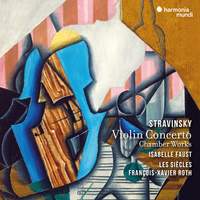Recording of the Week,
Stravinsky from Isabelle Faust, François-Xavier Roth and Les Siècles
Today’s Recording of the Week traces its origins back a couple of years – inspired by her foray into the drier, more sardonic side of Stravinsky with The Soldier’s Tale, Isabelle Faust is back for more with his 1931 Violin Concerto, in the company of Les Siècles and François-Xavier Roth.
A graceful excerpt from Apollon Musagète acts as a curtain-raiser – the refined archaic soundworld giving a false sense of security, though with a note of darkness creeping in at the end. The main event, though, is the concerto, an unconventional and bracing work in every way. Comprising a toccata, two arias and a capriccio in a deliberate clean break with the traditional concerto and its three-movement mould, and playing with unusual juxtapositions of instruments, it’s a distinctly unsentimental – even iconoclastic – affair.
 I have a real soft spot for Stravinsky in his neoclassical moods – I’d probably listen to the Symphony in C over the Rite of Spring to be honest – and this work sits squarely within that style. Clear, unfussy textures are the order of the day, for which the period instruments of Les Siècles (right down to the timpani and bass drum) are absolutely perfect. It’s most noticeable in the strings, which are as far from today’s mainstream orchestral sound as are the silken swoons of a Golden-Era Hollywood soundtrack, but in exactly the opposite direction. There are also a few delightfully folksy bits of double-stopping for the soloist in the first movement, where Faust really bites into the strings and leans into that characteristic jangling sound.
I have a real soft spot for Stravinsky in his neoclassical moods – I’d probably listen to the Symphony in C over the Rite of Spring to be honest – and this work sits squarely within that style. Clear, unfussy textures are the order of the day, for which the period instruments of Les Siècles (right down to the timpani and bass drum) are absolutely perfect. It’s most noticeable in the strings, which are as far from today’s mainstream orchestral sound as are the silken swoons of a Golden-Era Hollywood soundtrack, but in exactly the opposite direction. There are also a few delightfully folksy bits of double-stopping for the soloist in the first movement, where Faust really bites into the strings and leans into that characteristic jangling sound.
By the composer’s own admission this is less a virtuosic showstopper than it is a twentieth-century response to the concertos of JS Bach, as well as drawing heavily on chamber music – and the lack of overt virtuosity means that the soloist must find other ways to impress. For me, the most effective moments are those where Faust finds real sensitivity and gentleness in music that’s often playful and acerbic. Nowhere is this more true than in the third movement of the concerto (Aria II) – with a yearning, melancholy mood that’s then perfectly offset by the joyful cascade that opens the Capriccio. This rounds the concerto off with six refreshingly uncomplicated minutes of straightforward jollity, and Faust finally has a real chance to indulge in some conventional acrobatics.
As if to further emphasise the concerto’s debt to chamber music, the remainder of the repertoire on the album is chamber music. The Three Pieces for string quartet – experimental, abstract works of almost serialist brevity and compression that still sound distinctly “contemporary” a century on – continue the theme of varied textures. Stravinsky deploys various extended string techniques to create an unexpectedly varied sound-world – vigorous, rough-around-the-edges evocations of unpolished amateur folk musicmaking, eerie sul tasto whispering, mysterious tapping sounds, aggressive sawing and more. Needless to say, Faust and her dream team (Martial Gauthier, Carole Roth and Robin Michael) acquit themselves admirably, and the third of the pieces casts a particularly brooding, atmospheric spell.
Denis Herlin (an expert in French music at Manchester’s Royal Northern College) notes in the booklet that Stravinsky was especially fond of working with woodwind, brass and percussion textures. One can hardly begrudge a predominantly string-focused album that consciously focuses its attention elsewhere, but I did particularly enjoy the arrangement of the Pastorale for violin and four reed instruments. It’s a lovely inversion of the normal configuration of a wind instrument accompanied by string quartet. This way round is surely not the easiest texture to manage, and it’s credit to the musicians that the balance is not merely immaculate but unobtrusively so, with no sense of anyone deliberately playing up or down. I never thought I’d be likening Stravinsky to a barrel-organ outside of talking about Petrushka, but that’s exactly the effect. As a foundation for the gentle, wistful violin melody, it’s delightful.
I know it’s not fair to everyone else when Les Siècles continually make benchmark period recordings of twentieth-century orchestral repertoire, but it’s just as true here as of their Ravel or their Debussy; this new recording of the Violin Concerto really does show the work in a new light, and the chamber works are the perfect companion-pieces.
Isabelle Faust (violin), François-Xavier Roth, Les Siècles
Available Formats: MP3, FLAC, Hi-Res FLAC



